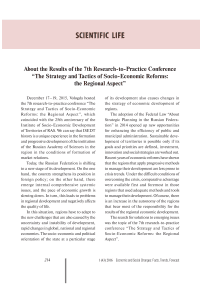About the results of the 7th research-to-practice conference “The strategy and tactics of socio-economic reforms: the regional aspect”
Автор: Babich Lubov Vasilevna
Журнал: Economic and Social Changes: Facts, Trends, Forecast @volnc-esc-en
Рубрика: Scientific life
Статья в выпуске: 1 (43) т.9, 2016 года.
Бесплатный доступ
Короткий адрес: https://sciup.org/147223802
IDR: 147223802
Текст обзорной статьи About the results of the 7th research-to-practice conference “The strategy and tactics of socio-economic reforms: the regional aspect”
December 17–19, 2015, Vologda hosted the 7th research-to-practice conference “The Strategy and Tactics of Socio-Economic Reforms: the Regional Aspect”, which coincided with the 25th anniversary of the Institute of Socio-Economic Development of Territories of RAS. We can say that ISEDT history is a unique experience in the formation and progressive development of the institution of the Russian Academy of Sciences in the region in the conditions of formation of market relations.
Today, the Russian Federation is shifting to a new stage of its development. On the one hand, the country strengthens its position in foreign policy; on the other hand, there emerge internal comprehensive systemic issues, and the pace of economic growth is slowing down. In turn, this leads to problems in regional development and negatively affects the quality of life.
In this situation, regions have to adapt to the new challenges that are also caused by the uncertainty and instability of development, rapid changes in global, national and regional economies. The socio-economic and political orientation of the state at a particular stage of its development also causes changes in the strategy of economic development of regions.
The adoption of the Federal Law “About Strategic Planning in the Russian Federation” in 2014 opened up new opportunities for enhancing the efficiency of public and municipal administration. Sustainable development of territories is possible only if its goals and priorities are defined, investment, innovation and social strategies are worked out. Recent years of economic reforms have shown that the regions that apply progressive methods to manage their development are less prone to crisis trends. Under the difficult conditions of overcoming the crisis, comparative advantage were available first and foremost in those regions that used adequate methods and tools to manage their development. Of course, there is an increase in the autonomy of the regions that bear most of the responsibility for the results of the regional economic development.
The search for solutions to emerging issues was the topic of the 7th research-to-practice conference “The Strategy and Tactics of Socio-Economic Reforms: the Regional Aspect”.
The conference was organized by the Federal Agency for Scientific Organizations, the Russian Academy of Sciences, the Government of the Vologda Oblast, the Department for Strategic Planning of the Vologda Oblast, Vologda City Administration, and the Institute of Socio-Economic Development of Territories of RAS.
The goal of the conference was to develop the theory and practice of socio-economic reforming and development prospects of Russia’s regions in the context of modernization transformations. Scientists engaged in regional studies, representatives of state research and scientific institutions, government authorities, the media, non-governmental and commercial organizations discussed the successes and failures, oppo rtunities and mechanisms to improve public administration efficiency in the sphere of formation and implementation of regional policy.
Over 300 people participated in the event. Leading Russian scientists A.D. Nekipelov, M.K. Gorshkov, V.N. Lazhentsev, R.S. Grinberg, S.D. Valentey, S.S. Gubanov and others presented their reports at the conference.
In the framework of the scientific forum, the participants discussed the importance of socio-economic reforms for regional development at the new stage of formation of the Russian statehood; attempts were made to assess positive results achieved in the framework of the ongoing reforms, to identify problems and possible ways to solve them. Great attention was paid to the issues of the Russian regions in contemporary Russian society and current challenges, and also to the role and importance of improving the quality of public administration.
V.A. Ilyin – ISEDT RAS Director, Doctor of Economics, Professor; A.I. Sherlygin – First Deputy Governor of the Vologda Oblast; M.Yu. Romanovsky – Head of the Department for Coordination of Work of Scientific Organizations under the FANO of Russia; Academician A.D. Nekipelov – Director of Moscow School of Economics at Moscow State University – these participants made their welcome addresses at the opening of the forum.
V.A. Ilyin pointed out that the first conference was held in 1997 under the guidance of Academician D.S. Lvov whose authority contributed to the involvement of academicians and leading economic scientists of the Russian Academy of Sciences in the conference.
A.I. Sherlygin welcomed the conference participants on behalf of the Vologda Oblast Governor O.A. Kuvshinnikov. A.I. Sherlygin noted that technological modernization, the necessity of which was underlined by President Vladimir Putin, is impossible without innovation and scientific developments. The current situation requires new approaches and bold solutions. Today, the competitive advantages of the economy and the possibility of modernization are largely associated with the accumulated and realized human potential. The Vologda Oblast Government pays considerable attention to the development of personnel, scientific and innovation potential in order to establish progressive economic foundations that will define the image of the region in 15–20 years.
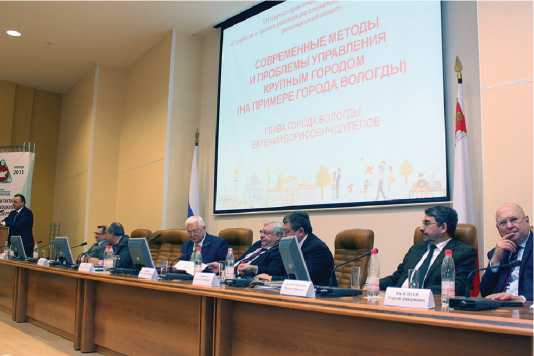
Presidium
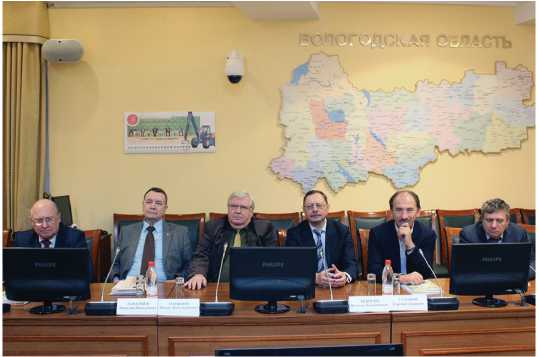
Plenary Session
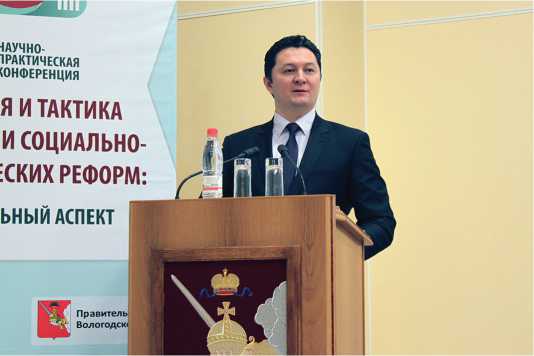
A.I. Sherlygin
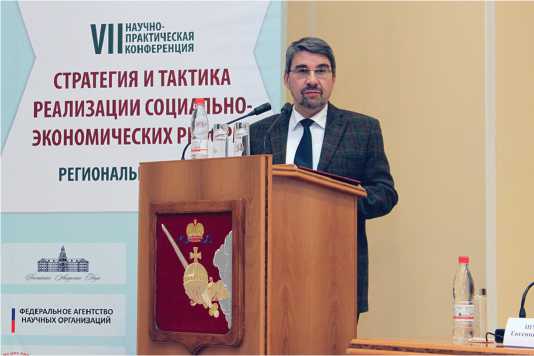
M.Yu. Romanovsky
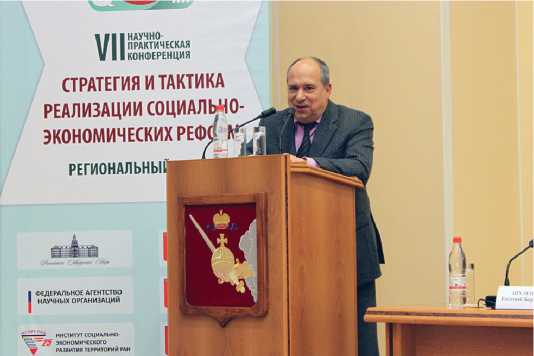
A.D. Nekipelov
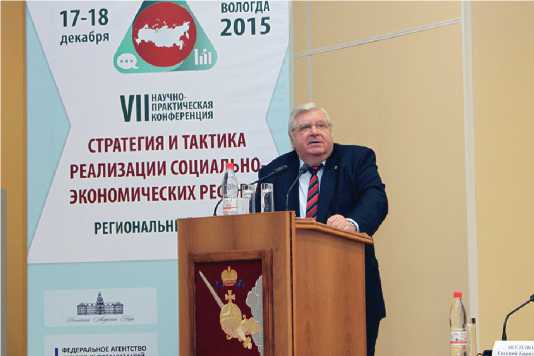
M.K. Gorshkov
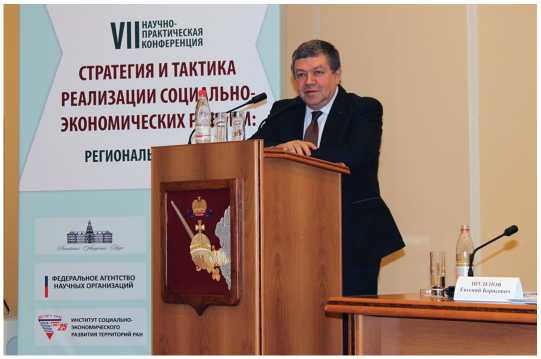
R.S. Grinberg
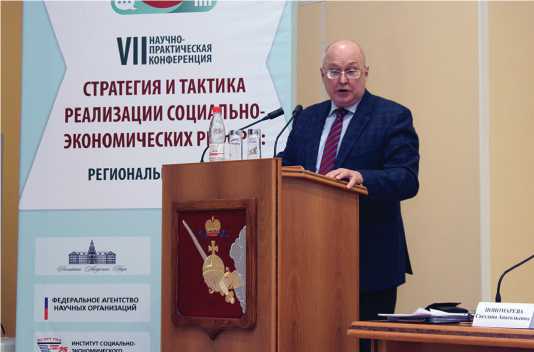
S.D. Valentey
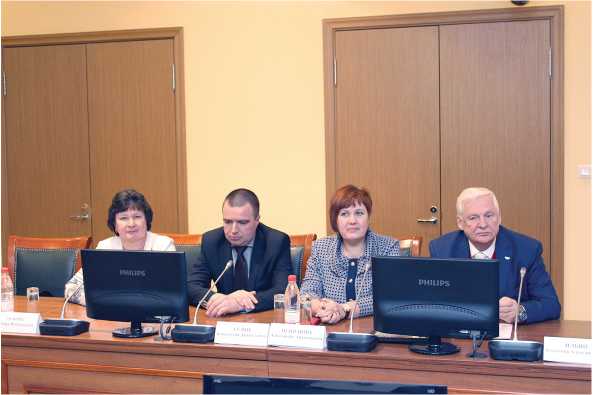
From right to left: V.A. Ilyin, A.A. Shabunova, K.A. Gulin, T.V. Uskova
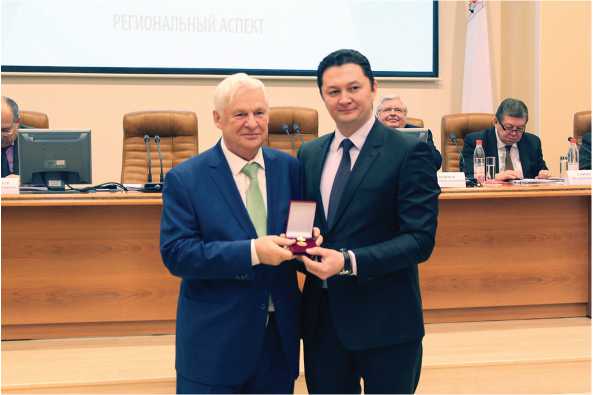
V.A. Ilyin receives the highest state award of the Vologda Oblast
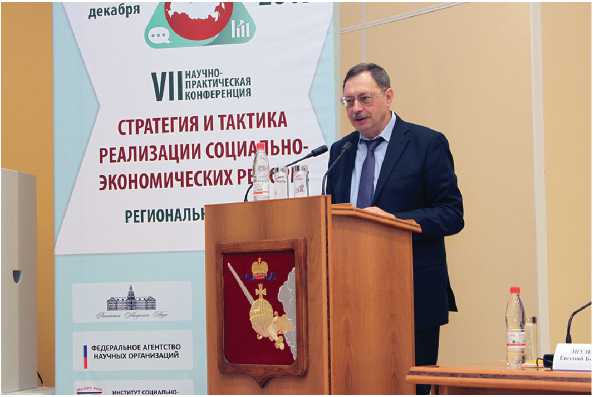
V.V. Lokosov
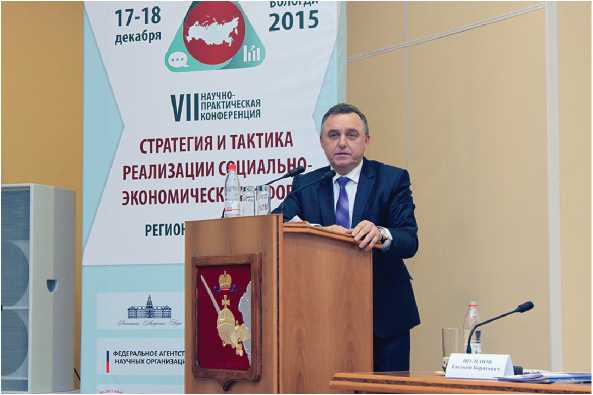
E.B. Shulepov
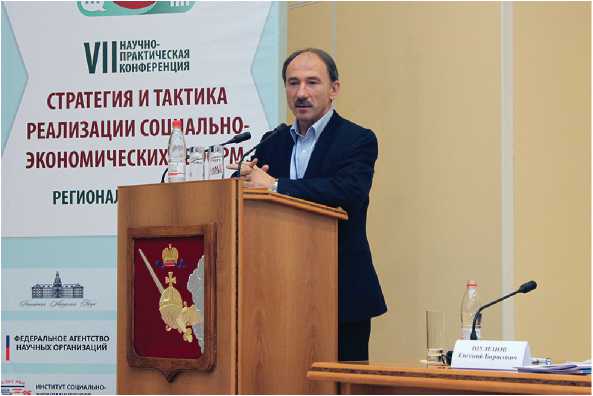
S.S. Gubanov
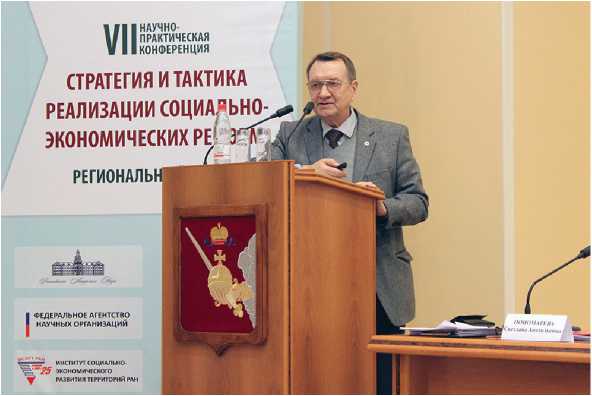
V.N. Lazhentsev
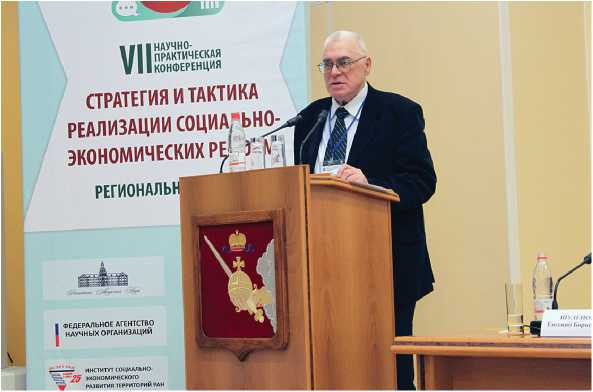
V.V. Markin
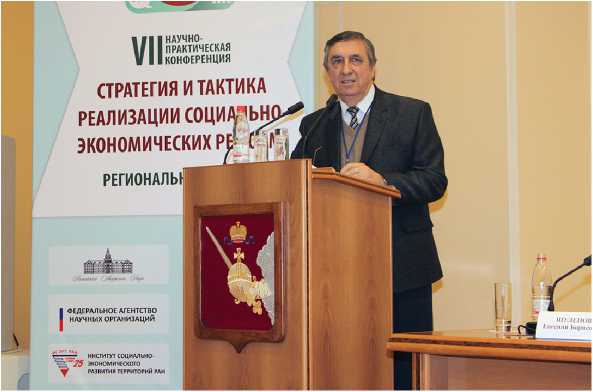
V.K. Egorov
M.Yu. Romanovsky stressed the importance of the issues to be discussed at the conference and wished ISEDT RAS researchers success in their work.
According to A.D. Nekipelov, the fact that this forum is held on a systematic basis – and this is already the seventh conference – indicates the level of development of science in the Vologda Oblast and the development of close cooperation between the Vologda Oblast Government and academic institutions. A.D. Nekipelov stressed that the topic of the conference had been chosen very accurately. At present, the country and its regions face a great number of problems, and if they remain unsolved, it will be difficult to talk about strategic objectives. But if we do not look into the future, we can get caught up in dwelling upon what is happening now. Today, the topic of the strategy attracts attention of different parties. The strategy till 2030 is being developed at the federal level. It has been agreed that the strategy should ensure modernization of the country, its economy and society as a whole. However, there is a wide field for discussion of questions relating to what has to be done on a large-scale basis. This problem can be solved if there are strategic approaches to various areas of economic policy. A.D. Nekipelov pointed out that it was therefore very important, that this problem would be considered as a strategy of a region – the region that was interesting and complex, and the results of the discussion should be very significant. It would be a sort of test of common approaches and specifics that would inevitably characterize the application of this strategy in different regions, in this case, the Vologda Oblast.
The conference was held in the format of plenary sessions, each of which had its own subject for discussion. The topic of the first plenary session “Russia in the New SocioPolitical Reality: Challenges and Risks” was due to the following circumstances. At the end of the 20th and beginning of the 21st century, human civilization went through the qualitative changes that lead to the formation of a new social reality, the immanent elements of which are potential threats and risks that can involve modern society in a global catastrophe.
Socio-economic contradictions in contemporary Russian society have become key obstacles to the transition to a new development model that will replace the resource-based model which exhausted its capacity. Human potential, social capital and scientific knowledge are becoming crucial development factors in the new geopolitical and social reality. The main report “Russian Society: a Year in the Conditions of Crisis and Sanctions” was delivered by Mikhail Konstantinovich Gorshkov, RAS Academician, Director of the Institute of Sociology of RAS. He presented the findings of the “third wave” of the monitoring (October 2015) of the all-Russian sociological research. It shows the opinion of the Russians on the following issues: changes happening in the society; the impact of the crisis on the socio-psychological well-being of the Russians; what the Russians are ready to give up for the sake of their country; main contradictions in the society in the context of value perception of the population; the government and society in crisis conditions: between consolidation and dissatisfaction; what is more important in the daily lives of the Russians today.
Delivering their reports, A.I. Sherlygin, V.V. Lokosov, D.V. Afanasiev, V.V. Markin, and A.A. Shabunova addressed the issues of transition of Russia’s economy to a new development model, and the issues of social cohesion and development of civil society.
The second plenary session was devoted to the issues of improving the quality of public administration. Modern Russian society is a result of the reforms that transformed the Soviet planned economic system into a market system. However, more than twenty years of market transformation have not produced the desired effect. The operation of the national economy in the conditions of market and its integration into the world economy require new, science-based forms and methods of socio-economic processes management. In this regard, the issue of public administration efficiency becomes particularly important.
In the framework of the session, its participants discussed the reports and recommendations that substantiated the necessity of essential correction of socioeconomic policy pursued by the state for overcoming negative trends in the economy, accelerating economic growth, increasing the real incomes and enhancing the quality of life of the population on this basis.
Summing up his speech, R.S. Grinberg, RAS Corresponding Member, Scientific Director of the Institute of Economics of RAS pointed out the following regularity: the change of power occurs through the political process, and political competition is a very important tool to change economic policy.
E.B. Shulepov, Head of Vologda City presented the experience of Vologda in his report “Modern Methods and Issues of Managing a City”. Reports were also made by S.S. Gubanov, D.B. Kuvalin, and V.K. Egorov.
It was no coincidence that the third plenary session was devoted to current issues of Russia’s regions. Socio-economic space of Russia is characterized by heterogeneity that has a significant impact on the functioning of the state, on the effectiveness of socio-economic policy, its structural component, and on the strategy and mechanisms of institutional reforms. Sustained negative trends in the economy and social sphere of Russia’s regions and their substantial differentiation in terms of socio-economic development reduce competitiveness and security of the country, prevent the economy from shifting to a new model of development.
S.D. Valentey, Doctor of Economics, Professor, Scientific Director of Plekhanov Russian University of Economics, Chief Editor of the journal “Federalism” spoke on the topic “Russian Regions and Economic Growth”, in which he attempted to show on the example of interesting scientific publications that national experts, even the leading ones, are far from understanding the importance of regional specifics of economic development in formulating recommendations on how to overcome the crisis in Russia’s economy. According to S.D. Valentey, this problem is crucial. The academic community bears part of the blame for the insufficient attention of the executive and legislative branches of government to the role of regional factors in the development of Russia’s economy.
S.A. Ponomareva, V.N. Lazhentsev, K.V. Yankov spoke about scientifically sound solutions to modern problems of Russia’s regions ensuring the effective modernization of regional socio-economic systems.
The conference participants appreciated the opportunity to get acquainted with lessons learned socio-economic reform and regional development in the context of the modernization and transformation mechanisms for improving the efficiency of state management in the sphere of formation and implementation of regional policy. Great interest was shown by the presenters the results of empirical studies on the issues discussed.
The Institute of Socio-Economic Development of Territories of the Russian Academy of Sciences expresses appreciation to the Federal Agency for Scientific Organizations, the Vologda Oblast Government, the Vologda Oblast Department for Strategic Planning, the Department of Social Sciences of the Russian Academy of Sciences, and Vologda City Administration for their support and assistance in organizing this very important scientific event and hopes that the tradition started in 1997, will continue in the future.
L.V. Babich ISEDT RAS Deputy Director Ph.D. in Economics

